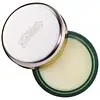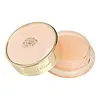What's inside
What's inside
 Key Ingredients
Key Ingredients

 Benefits
Benefits

 Concerns
Concerns

 Ingredients Side-by-side
Ingredients Side-by-side

Petrolatum
EmollientOctyldodecanol
EmollientMicrocrystalline Wax
Emulsion StabilisingOctyldodecyl Stearoyl Stearate
EmollientBis-Diglyceryl Polyacyladipate-2
EmollientPolyglyceryl-10 Pentaoleate
EmulsifyingPhenyl Trimethicone
Skin ConditioningAloe Barbadensis Leaf Extract
EmollientAlgae Extract
EmollientMalachite
Skin ConditioningTourmaline
Sesamum Indicum Seed Oil
EmollientEucalyptus Globulus Leaf Oil
PerfumingSesamum Indicum Seed Powder
Skin ConditioningMedicago Sativa Seed Powder
Skin ConditioningHelianthus Annuus Seedcake
AbrasivePrunus Amygdalus Dulcis Seed Meal
AbrasiveSodium Gluconate
Skin ConditioningCopper Gluconate
Skin ConditioningCalcium Gluconate
HumectantMagnesium Gluconate
Skin ConditioningZinc Gluconate
Skin ConditioningTocopheryl Succinate
AntioxidantNiacin
SmoothingRicinus Communis Seed Oil
MaskingGlycine Soja Oil
EmollientPhytosphingosine
Skin ConditioningTrehalose
HumectantPolybutene
Tocopheryl Acetate
AntioxidantCholesterol
EmollientGlyceryl Distearate
EmollientWater
Skin ConditioningGlycerin
HumectantMenthyl PCA
HumectantOleic Acid
EmollientPalmitic Acid
EmollientSodium Saccharin
MaskingSorbitan Sesquioleate
EmulsifyingCI 77220
Cosmetic ColorantSodium Bicarbonate
AbrasiveParfum
MaskingBenzyl Benzoate
AntimicrobialLimonene
PerfumingLinalool
PerfumingBHT
AntioxidantCI 42090
Cosmetic ColorantCI 19140
Cosmetic ColorantPetrolatum, Octyldodecanol, Microcrystalline Wax, Octyldodecyl Stearoyl Stearate, Bis-Diglyceryl Polyacyladipate-2, Polyglyceryl-10 Pentaoleate, Phenyl Trimethicone, Aloe Barbadensis Leaf Extract, Algae Extract, Malachite, Tourmaline, Sesamum Indicum Seed Oil, Eucalyptus Globulus Leaf Oil, Sesamum Indicum Seed Powder, Medicago Sativa Seed Powder, Helianthus Annuus Seedcake, Prunus Amygdalus Dulcis Seed Meal, Sodium Gluconate, Copper Gluconate, Calcium Gluconate, Magnesium Gluconate, Zinc Gluconate, Tocopheryl Succinate, Niacin, Ricinus Communis Seed Oil, Glycine Soja Oil, Phytosphingosine, Trehalose, Polybutene, Tocopheryl Acetate, Cholesterol, Glyceryl Distearate, Water, Glycerin, Menthyl PCA, Oleic Acid, Palmitic Acid, Sodium Saccharin, Sorbitan Sesquioleate, CI 77220, Sodium Bicarbonate, Parfum, Benzyl Benzoate, Limonene, Linalool, BHT, CI 42090, CI 19140
Diisostearyl Malate
EmollientPhytosteryl/Isostearyl/Cetyl/Stearyl/Behenyl Dimer Dilinoleate
Skin ConditioningDipentaerythrityl Hexahydroxystearate/Hexastearate/Hexarosinate
Skin ConditioningDextrin Palmitate
EmulsifyingGlycosphingolipids
EmollientPhospholipids
Skin ConditioningCholesterol
EmollientAsiaticoside
AntioxidantCucurbita Pepo Powder
Skin ConditioningPearl Powder
Gold
Cosmetic ColorantCaprylic/Capric Triglyceride
MaskingSaposhnikovia Divaricata Root Extract
AntimicrobialGlycyrrhiza Glabra Root Extract
BleachingCimicifuga Dahurica Root Extract
AntioxidantPanax Ginseng Root Extract
EmollientPaeonia Lactiflora Extract
AstringentPueraria Lobata Root Extract
HumectantAngelica Acutiloba Root Extract
Skin ConditioningCornus Officinalis Fruit Extract
Skin ConditioningVelvet Extract
HumectantThymus Vulgaris Extract
Perfuming1,2-Hexanediol
Skin ConditioningDimethicone
EmollientButylene Glycol
HumectantOctyldodecanol
EmollientTocopheryl Acetate
AntioxidantNiacinamide
SmoothingSodium Cocoyl Amino Acids
CleansingSarcosine
Skin ConditioningPotassium Aspartate
Skin ConditioningMagnesium Aspartate
Skin ConditioningTalc
AbrasiveWater
Skin ConditioningAcetyl Hexapeptide-8
HumectantParfum
MaskingBenzyl Salicylate
PerfumingLimonene
PerfumingHydroxycitronellal
PerfumingLinalool
PerfumingCI 77492
Cosmetic ColorantCI 77491
Cosmetic ColorantCI 77499
Cosmetic ColorantDiisostearyl Malate, Phytosteryl/Isostearyl/Cetyl/Stearyl/Behenyl Dimer Dilinoleate, Dipentaerythrityl Hexahydroxystearate/Hexastearate/Hexarosinate, Dextrin Palmitate, Glycosphingolipids, Phospholipids, Cholesterol, Asiaticoside, Cucurbita Pepo Powder, Pearl Powder, Gold, Caprylic/Capric Triglyceride, Saposhnikovia Divaricata Root Extract, Glycyrrhiza Glabra Root Extract, Cimicifuga Dahurica Root Extract, Panax Ginseng Root Extract, Paeonia Lactiflora Extract, Pueraria Lobata Root Extract, Angelica Acutiloba Root Extract, Cornus Officinalis Fruit Extract, Velvet Extract, Thymus Vulgaris Extract, 1,2-Hexanediol, Dimethicone, Butylene Glycol, Octyldodecanol, Tocopheryl Acetate, Niacinamide, Sodium Cocoyl Amino Acids, Sarcosine, Potassium Aspartate, Magnesium Aspartate, Talc, Water, Acetyl Hexapeptide-8, Parfum, Benzyl Salicylate, Limonene, Hydroxycitronellal, Linalool, CI 77492, CI 77491, CI 77499
 Reviews
Reviews

Ingredients Explained
These ingredients are found in both products.
Ingredients higher up in an ingredient list are typically present in a larger amount.
Cholesterol is a class of organic molecules called lipids. It helps hydrate your skin and is essential to having a healthy skin barrier.
Our skin naturally contains cholesterol in the outermost layer. Besides cholesterol, it also contains ceramides and fatty acids. Cholesterol makes up about 1/4 of your skin's outer layer and barrier. Your skin barrier is responsible for keeping allergens and microbes out. Having a healthy skin barrier is also responsible for keeping your skin firm and plump.
Our bodies use cholestrol to create vitamin D, steroid hormones, and more.
Learn more about CholesterolLimonene is a fragrance that adds scent and taste to a formulation.
It's found in the peel oil of citrus fruits and other plants such as lavender and eucalyptus. The scent of limonene is generally described as "sweet citrus".
Limonene acts as an antioxidant, meaning it helps neutralize free radicals.
When exposed to air, oxidized limonene may sensitize the skin. Because of this, limonene is often avoided by people with sensitive skin.
The term 'fragrance' is not regulated in many countries. In many cases, it is up to the brand to define this term. For instance, many brands choose to label themselves as "fragrance-free" because they are not using synthetic fragrances. However, their products may still contain ingredients such as essential oils that are considered a fragrance.
Learn more about LimoneneLinalool is a fragrance and helps add scent to products. It's derived from common plants such as cinnamon, mint, citrus, and lavender.
Like Limonene, this ingredient oxidizes when exposed to air. Oxidized linalool can cause allergies and skin sensitivity.
This ingredient has a scent that is floral, spicy tropical, and citrus-like.
Learn more about LinaloolOctyldodecanol is a fatty alcohol. It is primarily used to enhance the texture of products.
As an emulsifier, Octyldodecanol helps prevent the oils and waters from separating. It also prevents ingredients from creating foam when shaken.
Octyldodecanol is created by reducing fatty acid to an alcohol.
Due to its high molecular weight, it does not get absorbed into the skin.
Learn more about OctyldodecanolParfum is a catch-all term for an ingredient or more that is used to give a scent to products.
Also called "fragrance", this ingredient can be a blend of hundreds of chemicals or plant oils. This means every product with "fragrance" or "parfum" in the ingredients list is a different mixture.
For instance, Habanolide is a proprietary trade name for a specific aroma chemical. When used as a fragrance ingredient in cosmetics, most aroma chemicals fall under the broad labeling category of “FRAGRANCE” or “PARFUM” according to EU and US regulations.
The term 'parfum' or 'fragrance' is not regulated in many countries. In many cases, it is up to the brand to define this term.
For instance, many brands choose to label themselves as "fragrance-free" because they are not using synthetic fragrances. However, their products may still contain ingredients such as essential oils that are considered a fragrance by INCI standards.
One example is Calendula flower extract. Calendula is an essential oil that still imparts a scent or 'fragrance'.
Depending on the blend, the ingredients in the mixture can cause allergies and sensitivities on the skin. Some ingredients that are known EU allergens include linalool and citronellol.
Parfum can also be used to mask or cover an unpleasant scent.
The bottom line is: not all fragrances/parfum/ingredients are created equally. If you are worried about fragrances, we recommend taking a closer look at an ingredient. And of course, we always recommend speaking with a professional.
Learn more about ParfumTocopheryl Acetate is AKA Vitamin E. It is an antioxidant and protects your skin from free radicals. Free radicals damage the skin by breaking down collagen.
One study found using Tocopheryl Acetate with Vitamin C decreased the number of sunburned cells.
Tocopheryl Acetate is commonly found in both skincare and dietary supplements.
Learn more about Tocopheryl AcetateWater. It's the most common cosmetic ingredient of all. You'll usually see it at the top of ingredient lists, meaning that it makes up the largest part of the product.
So why is it so popular? Water most often acts as a solvent - this means that it helps dissolve other ingredients into the formulation.
You'll also recognize water as that liquid we all need to stay alive. If you see this, drink a glass of water. Stay hydrated!
Learn more about Water